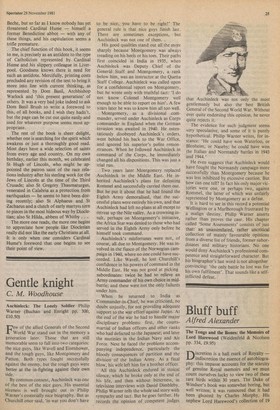Gentle knight
C. M. Woodhouse Auchinleck: The Lonely Soldier Philip Warner (Buchan and Enright pp. 300, £10.50) Elew of the allied Generals of the Second World War stand out in the memory a generation later. Those that are still memorable seem to fall into two categories: the nice guys, like Wavell and Eisenhower, and the tough guys, like Montgomery and Patton. Both types fought successfully against the enemy, but the tough guys were better at the in-fighting against their own side.
By common consent, Auchinleck was one of the best of the nice guys. His essential niceness is well brought out in Philip Warner's essentially nice biography. But as Churchill once said, 'in war you don't have to be nice, you have to be right!' The general rule is that nice guys finish last. There are sometimes exceptions, but Auchinleck was not one of them.
His good qualities stand out all the more sharply because Montgomery was always treading on his heels or his toes. Their paths first coincided in India in 1935, when Auchinleck was Deputy Chief of the General Staff and Montgomery, a rank below him, was an instructor at the Quetta Staff College. Auchinleck was called upon for a confidential report on Montgomery, but he wrote only with truthful tact: 'I do not know Colonel Montgomery well enough to be able to report on him'. A few years later he was to know him all too well.
Montgomery, as a divisional commander, served under Auchinleck as Corps commander in England when the German invasion was awaited in 1940. He ostentatiously disobeyed Auchinleck's orders, went behind his back to the War Office, and ignored his superior's polite remonstrances. When he followed Auchinleck in command of the Corps, he immediately changed all his dispositions. This was just a trial run.
Two years later Montgomery replaced Auchinleck in the Middle East. He inherited Auchinleck's plans for defeating Rommel and successfully carried them out. But he put it about that he had found the Eighth Army demoralised, that the successful plans were entirely his own, and that Auchinleck had left no plans at all except to retreat up the Nile valley. As a crowning insult, perhaps on Montgomery's initiative, the Africa Star was denied to those who had served in the Eighth Army only before he himself took command.
Auchinleck's misfortunes were not, of course, all due to Montgomery. He was involved in the fiasco of the Norwegian campaign in 1940, where no one could have succeeded. Like Wavell, he lost Churchill's confidence in his powers of command in the Middle East. He was not good at picking subordinates: twice he had to relieve an Army commander of his own choice in midbattle; and these were not the only failures under him.
When he returned to India as Commander-in-Chief, he was criticised, no doubt unjustly, for not providing adequate support to the war effort against Japan. At the end of the war he had to handle major disciplinary problems: first, the courtsmartial of Indian officers and other ranks who had defected to the Japanese; and later the mutinies in the Indian Navy and Air Force. Next he faced the problems accompanying independence, particularly the bloody consequences of partition and the division of the Indian Army. As a final blow, his wife left him for a brother officer.
All this Auchinleck endured in stoical silence, which he broke only at the end of his life, and then without bitterness, in television interviews with David Dimbleby. Philip Warner tells the whole sad story with sympathy and tact. But he goes further. He records the opinion of competent judges that Auchinleck was not only the most gentlemanly but also the best British General of the Second World War. Without ever quite endorsing this opinion, he never quite rejects it.
The evidence for such judgment seems very speculative, and some of it is purely hypothetical. Philip Warner writes, for instance: 'He could have won Waterloo, or Blenheim, or Naseby; he could have won the Italian and Normandy battles in 1943 and 1944.'
He even suggests that Auchinleck would have fought the Normandy campaign more successfully than Montgomery because he was less inhibited by excessive caution. But how can one tell? In fact his only major victories were one, or perhaps two, against Rommel, the latter of which was unfairly represented by Montgomery as a defeat.
It is hard to see in this record a potential Wellington or a Marlborough frustrated by a malign destiny. Philip Warner asserts rather than proves the case. His chapter called 'Some Assessments' consists of just that: an unassimilated, rather uncritical collection of mainly favourable opinions from a diverse list of friends, former subordinates and military historians. No one would deny Auchinleck's professional competence and straightforward character. But his biographer's last word is not altogether convincing: 'the only battle he lost was for his own fulfilment'. That sounds like a selfinflicted defeat.














































 Previous page
Previous page